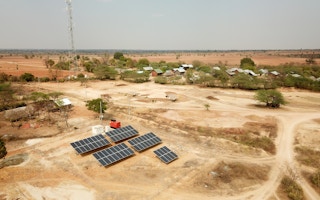Two Southeast Asian business conglomerates have teamed up to invest at least US$30 million in renewable energy projects in Myanmar, which has one the region’s lowest rates of access to grid electricity.
To continue reading, subscribe to Eco‑Business.
There's something for everyone. We offer a range of subscription plans.
- Access our stories and receive our Insights Weekly newsletter with the free EB Member plan.
- Unlock unlimited access to our content and archive with EB Circle.
- Publish your content with EB Premium.
Myanmar-focused Yoma Strategic Holdings, which is listed on the Singapore stock exchange, will form a 50:50 joint venture with AC Energy, the energy arm of Ayala Corporation of the Philippines, to drive the growth of Yoma Micro Power.
Together, they want to develop about 200 megawatts (MW) of renewable energy projects in Myanmar, including participation in large utility-scale projects.
Myanmar, an emerging economy in Southeast Asia, has one of the world’s lowest per capita electricity consumption. Each of its 53 million people consumed only 0.3 MWh of electricity in 2017—or 3 per cent of the 9.2MWh that an average person in Singapore consumed, according to the International Energy Agency.
“
Supply of electricity is one of the largest opportunities in Myanmar and also one of the biggest bottlenecks for economic development.
Melvyn Pun, chief executive officer, Yoma Strategic Holdings
The country suffers from chronic power shortages with only 40 per cent of its rural population having access to the national grid. It currently derives its electricity from hydropower (70 per cent), natural gas (28 per cent) and coal (2 per cent), and the government has projected that solar energy will supply up to 5 per cent of its electricity by 2030.
The World Bank expects electricity consumption in Myanmar to grow at an average rate of 11 per cent a year until 2030—the year its government aims to achieve full electrification—and estimates that around US$2 billion of investment per year is required.
“Supply of electricity is one of the largest opportunities in Myanmar and also one of the biggest bottlenecks for economic development,” said Melvyn Pun, chief executive officer of Yoma Strategic, in a statement.
There is a need to increase generation capacity and build last-mile infrastructure to distribute electricity, he added.
The government’s recent hike in electricity tariffs has enhanced the attractiveness of solar energy for commercial and industrial companies, the joint venture partners said.
Yoma Micro Power builds micro power plants and minigrids in off-grid rural communities, as well as telecommunication towers in Myanmar. It is 35 per cent-owned by Yoma Strategic, while Norwegian private equity company Norfund and the World Bank’s International Finance Corporation each have a 30 per cent stake. The remaining 5 per cent is held by Yoma Micro Power founder and managing director Alakesh Chetia.
After the investment and restructuring, which is planned for 2020, the joint venture is expected to hold at least 50 per cent of Yoma Micro Power.
Following its pilot implementation of microgrids in 10 rural villages in the Sagaing Region last year, Yoma Micro Power is rolling out 250 micro power plants by end of this year. It expects to scale up to more than 2,000 sites by 2023, the joint venture partners said.
The partnership will take Ayala Corporation’s AC Energy closer to its 2025 goal of generating at least half of its energy output from renewables. It has more than US$1 billion of invested and committed renewable and thermal energy projects in the Philippines and the region.










